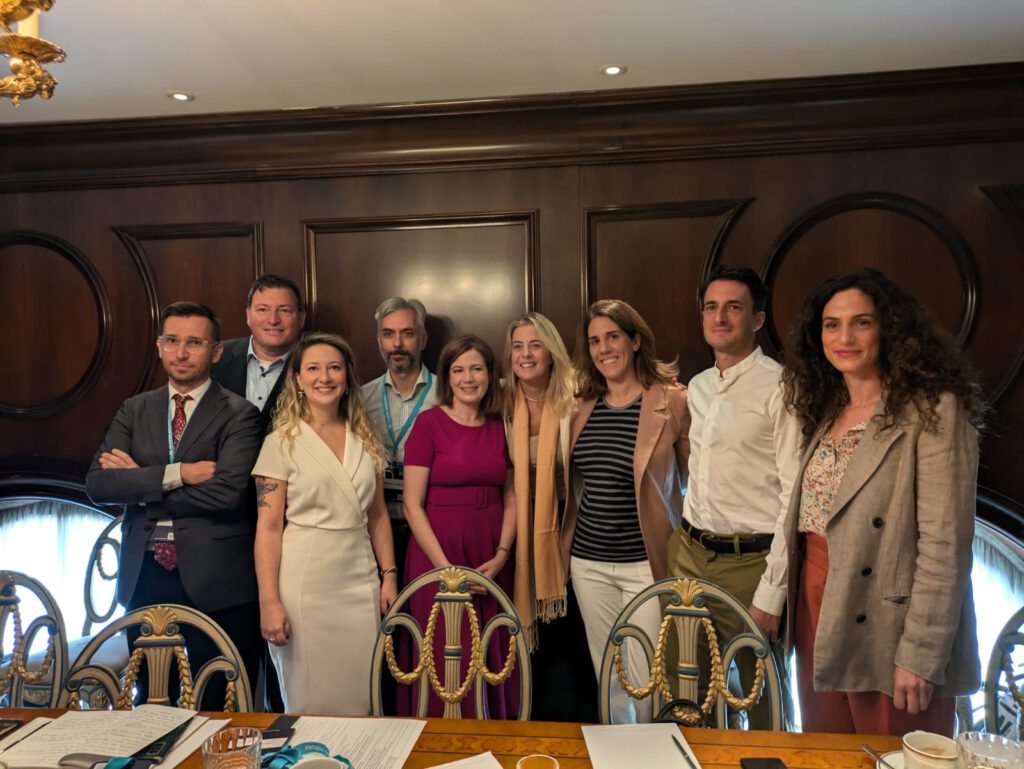Activities
GDL at Athens Democracy Forum 2024

Format
Topic
Fireside Chat with the German Ambassador to Greece, Andreas Kindl, at the Athens Democracy Forum (moderated by David Patrician)
On Tuesday morning, October 1, 2024, the German Ambassador to Greece, Andreas Kindl, participated in a fireside chat at the Grande Bretagne Hotel on the topic of “Addressing the Challenges of Misinformation and Disinformation in Democracy and Strategies to Enhance Media Literacy”. The discussion centered around the pressing issue of mis- and disinformation and explored approaches to strengthen media literacy. As with many sessions of the Global Diplomacy Lab, the conversation adhered to Chatham House rules.
Key Questions Raised:
- In the 2024 EU elections, both in Greece and other countries, there was a notable increase in false claims related to unemployment rates and economic instability. How did these disinformation campaigns affect Greek voters?
- Greece is planning to introduce an Artificial Intelligence platform to combat the spread of fake news. However, concerns have been raised that such measures, while aimed at curbing misinformation, may also risk suppressing legitimate journalism and dissenting opinions. What is your perspective on this issue?
- Discussions around fighting fake news have also surfaced in other countries. In Cyprus, for example, there is a proposal to criminalize the creation of fake news, which would impose prison sentences of up to one year and fines of up to EUR 3,000. What is your view on such legislative measures?
Session Takeaways:
- Technological Advancements and Regulatory Challenges: The rapid pace of technological progress is outstripping the ability of governments and regulatory frameworks to keep up. Are governments adequately equipped to address this challenge, or should the private sector take a more active role?
- Big Tech Regulation: There is a growing consensus that major technology companies must be more strictly regulated to mitigate the creation and spread of fake news on their platforms. This would involve stronger regulations and an increase in governmental resources to support these efforts.
- Media Literacy as a Core Educational Subject: Media literacy should be integrated into school curriculum as a core subject, on par with mathematics and language studies. Teaching media literacy from primary through secondary education could be a critical tool in combating misinformation and disinformation.
In conclusion, the session, attended by approximately 20 participants, was highly successful. The Ambassador appeared pleased with the format, and the Athens Democracy Forum team expressed great satisfaction with the depth of the discussion and the themes explored throughout the event.
Memory and Heritage as Soft Diplomacy Tools
The parallel session at this year’s Athens Democracy Forum entitled “Memory and Heritage as Soft Diplomacy Tools” (Athens, 1st of October 2024) emerged organically when the two moderators Dr Banu Pekol and Dr Giorgos Monogioudis explored how their fields of expertise could be intertwined in a constructive way. The concepts of memory and heritage are often associated with conflict and division, which is why we involved participants in an inspiring exchange on how they can be utilised as soft means to conflict resolution and a tool for unity.
Therefore, the key questions we asked were:
- How can cultural heritage be leveraged as a powerful tool for soft diplomacy?
- How can multi-track stakeholders promote a multidisciplinary approach to understanding the complex relationship between cultural heritage and diplomacy?
- How can we work with the interplay between truth, memory, and democracy, with a particular emphasis on the role of networks and the importance of documenting and interpreting sites with contested pasts?
- What are strategies for utilizing cultural heritage to foster understanding, cooperation, and reconciliation?
- How can we tackle the heritage that is difficult to reconcile?
Session Takeaways:
- Cultural heritage can divide or unite people, depending on how it is instrumentalised in each context at a given time.
- Cultural heritage tends to be perceived as a concept exclusively linked to the past but in fact it is ever evolving in the present. It needs to be modernized, otherwise we will lose all possibilities it presents for connecting it to the future.
- There is widespread idealisation of cultural heritage and its preservation, yet it may be necessary to consider whether cultural heritage should be preserved at any cost in a constantly changing world.
- Shared stories around difficult heritage sites are a method to start a dialogue.
- In many cases of contested cultural heritage, national and official bodies are reluctant to be involved, and so it is important to have multi-track diplomatic efforts. Also, implementing measures via civil society and showing that they work will motivate officials to be involved.